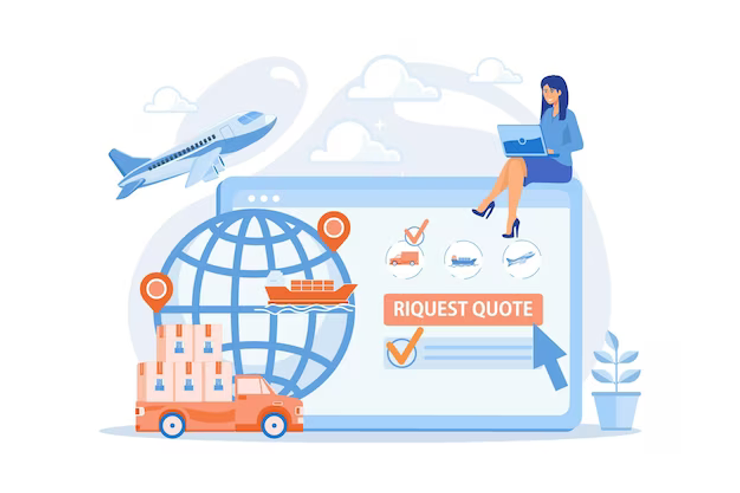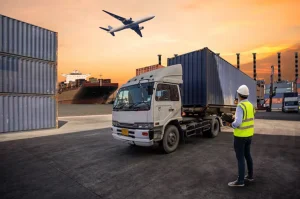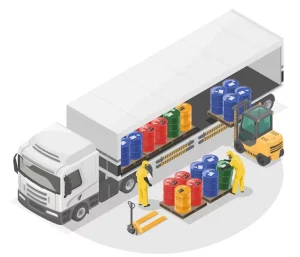In today’s global marketplace, efficient logistics and transportation play a pivotal role in determining the success of businesses engaged in international trade. Among the critical components of logistics, securing competitive international freight quotes stands as a cornerstone for cost-effective operations.
The Significance of International Freight Quotes
International freight quotes encapsulate the expenses associated with transporting goods across borders. They encompass various elements such as transportation modes (air, sea, and land), container types, customs duties, insurance, and handling charges. These quotes serve as vital benchmarks for businesses planning their budget, enabling them to streamline costs and allocate resources effectively.
Factors Influencing International Freight Quotes
The factors influencing international freight quotes encompass various elements that collectively determine the cost of transporting goods across borders.
1. Mode of Transport
Air Freight:
-
Speed vs. Cost: Air transport is generally quicker but more expensive compared to other modes. Urgent shipments often opt for this mode, despite the higher cost per unit.
-
Volume and Weight: Charges for air freight are often based on the volumetric or actual weight of the cargo, whichever is higher.
Sea Freight:
-
Economies of Scale: Shipping via sea can be more cost-effective for larger shipments due to economies of scale. However, it usually takes longer than air transport.
-
Container Type: Different types and sizes of containers impact pricing. Specialized containers for perishable goods or hazardous materials can incur higher costs.
Land Transport:
-
Regional Accessibility: Transport via road or rail within a region or continent can be more cost-effective for nearby destinations.
-
Customs and Borders: Land transport across international borders involves considerations for customs duties and regulations specific to each country.
2. Distance and Destination
-
Geographical Location: The distance goods travel impacts overall costs. Remote or less accessible locations often require additional logistical handling and thus incur higher expenses.
-
Infrastructure and Accessibility: The quality of infrastructure and accessibility to the destination affect transportation costs. Less developed routes might increase expenses.
3. Cargo Specifications
-
Type of Goods: Fragile, hazardous, oversized, or perishable items require specialized handling and packaging, contributing to increased costs.
-
Weight and Volume: The weight and volume of cargo directly influence freight charges, especially in sea and air freight calculations.
4. Customs and Duties
-
Tariffs and Taxes: Import/export duties, taxes, and tariffs imposed by different countries impact the overall cost of shipping goods across borders.
-
Customs Clearance: Expenses associated with customs documentation, inspections, and compliance also factor into the freight quote.
5. Market Conditions and Seasonality
-
Demand and Capacity: Fluctuations in demand for shipping services and available capacity in the market can influence pricing.
-
Seasonal Variations: Certain seasons or times of the year might witness increased demand, affecting freight costs.
6. Service Level and Additional Services
-
Transit Time: Faster delivery options come with higher costs.
-
Value-Added Services: Additional services like insurance, tracking, warehousing, and special handling contribute to the overall quote.
Understanding these multifaceted factors allows businesses to make informed decisions when negotiating international freight quotes. Strategic planning based on these elements can significantly impact cost efficiencies and overall supply chain management in international trade.
Strategies to Unlock Savings through International Freight Quotes
-
Comparative Analysis: Solicit quotes from multiple freight forwarders or shipping companies. Analyzing and comparing these quotes allows businesses to negotiate better terms and rates.
-
Consolidation and Optimization: Consolidating smaller shipments into larger ones or optimizing cargo space within containers can reduce costs per unit.
-
Technology Integration: Leveraging freight management software or platforms that provide real-time visibility, track shipments, and offer analytics can aid in making informed decisions and optimizing routes.
-
Long-Term Partnerships: Establishing enduring relationships with freight carriers or logistics providers often results in preferential rates and better service.
Benefits of Quotes
Quotes in the realm of international freight and logistics offer a multitude of benefits to businesses engaged in global trade. Here are some key advantages:
1. Cost Estimation and Budget Planning
-
Financial Forecasting: Accurate freight quotes provide businesses with a clear understanding of the costs involved in transporting goods internationally. This enables precise budgeting and financial planning.
2. Comparative Analysis and Negotiation
-
Vendor Selection: Soliciting multiple quotes allows for a comparative analysis of offerings from different freight carriers or logistics providers. This empowers businesses to select the most competitive and suitable option.
3. Operational Efficiency
-
Optimized Routes and Modes: Evaluating quotes helps in determining the most cost-effective transportation modes and routes, optimizing the supply chain, and reducing unnecessary expenses.
-
Consolidation Opportunities: Quotes assist in identifying opportunities for consolidating shipments, maximizing container space, and reducing per-unit transportation costs.
4. Risk Management and Transparency
-
Insight into Costs: Transparent quotes offer insights into the breakdown of costs, including insurance, customs duties, and other charges, aiding in risk assessment and mitigation.
-
Predictability: Accurate quotes provide a level of predictability, allowing businesses to anticipate expenses and plan contingencies effectively.
In essence, international freight quotes serve as invaluable tools that empower businesses to make informed decisions, mitigate risks, optimize costs, and enhance the efficiency of their global supply chains.
How to Obtain Quotes
Businesses can easily access Toptrans’ expertise by contacting our customer service team or initiating the quote request process through our user-friendly platform.
Contacting Toptrans: Reach out to Toptrans’ dedicated customer service team for swift and comprehensive assistance.
Quote Request Process: Submit details about your cargo, desired routes, and any additional services required through Toptrans’ streamlined quote request process.
Case Studies
Savings and Benefits: Explore how businesses, by partnering with Toptrans, have unlocked substantial savings and streamlined their logistics operations.
In conclusion, securing accurate international freight quotes through Toptrans not only unlocks significant cost savings but also ensures operational efficiency, tailored solutions, and regulatory compliance for your business. Reach out to our customer service team today to leverage our expertise and gain a competitive edge in the global marketplace.








